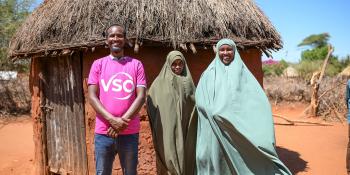One good deed can make waves long into the future. Thanks to the 'ripple effect' of volunteering, this Cambodian community is continuing to benefit from a project that concluded in 2018.
As the old saying goes, ‘You give a poor man a fish and you feed him for a day. Teach a man to fish and you feed him for a lifetime.’
The people of Tonle Sap in Cambodia don’t need to be taught how to fish. They’ve been at it for generations. But it’s been getting harder and harder, as overfishing, climate change and environmental degradation have taken their toll one of the largest bodies of freshwater in the world.
Drastic action had to be taken in order to save the lake - in 2012 a fishing ban was introduced. But what would become of families for whom casting nets was the established way of life?
Passing on skills and solutions
To address the problem, volunteers on a VSO project provided training to the community in how to raise fish in backyard ponds. What’s more, families learned how to get a better price for their fish, using enhanced processing techniques to make a higher-value product that could fetch double the old prices.
Training concluded in 2016. But when VSO volunteer filmmaker Sue Turbett visited earlier this year, she found that the skills people learned were still spreading.
Some 92% of the people trained by VSO on this project said they had shared their knowledge with at least five others.
Inspired by this 'ripple effect', Sue made the film below to capture the secondary impact on one fisherwoman, Samngath Yong, whose friend Thorn had been trained on the project.
"My life became much better": Samngath's story
Samngath Yong is one of those who benefited through the ‘ripple effect’. She says:
“My friend Thorn received training from VSO on how to process fish and she passed on what she’s learned to me."
Samngath learned hygienic methods for smoking, fermenting and drying fish, as well as how to succeed in the markets. All of this meant Samngath was able to get a much better price for her product, earning twice as much per kilo as before.
“After I got these skills, my life became much better," explains Samngath. "Now I will pass on this knowledge to other families, and also encourage the next generation to follow my example.”
Thorn also passed on the skills that she’d learned from VSO in book-keeping and saving. Samngath says the knowledge has made a huge difference to her family:
“I use my additional income to send my children and grandchildren to school. Then, I put some money into a savings group. I keep some for my healthcare, and then finally some in used to buy fishing equipment for next year. My life is now much more secure.”
Find out more about our work building resilient livelihoods
Find out more about how VSO programmes build sustainable livelihoods around the world, benefiting hundreds of thousands of people like Samngath.
Read more

A ripple of change: how VSO volunteers are transforming communities
Every act of volunteering begins with a choice — a decision to act out of a desire to make a difference. Across the world, VSO volunteers are proving that one spark of action can ignite something much bigger.

The two volunteers empowering girls and young women in Mozambique
Nelma and Carmirene and are two volunteers working on VSO's EAGLE project in Mozambique. For Nelma and Carmirene, education is not just about school, it is about meeting people where they are and using the right tools to challenging harmful norms. Here are their stories.
Opening doors to safety, education, and a brighter future
For girls in Karamoja, the poorest region in Uganda, being forced into early motherhood is all too common. This Christmas, you can open the doors to Safety, Education, and a Brighter Future.
